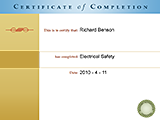Laboratory Safety: Laboratory Ergonomics

- Product ID
- smaxlerg
- Training Time ?
- 33 to 66 minutes
- Language(s)
- English
- Video Format
- Standard Definition
- Required Plugins
- MasteryNet Player
- Lesson Interactions
- 9
- Quiz Questions
- 16
- Closed Captioning



To work safely and maintain good ergonomic health in the lab, workers need to know how to avoid movements and work patterns that can be harmful. This training discusses the need to set up work areas correctly, as well as how to minimize the strain of using laboratory equipment, tools and instruments.
Areas covered in the training include the parts of the body most susceptible to ergonomic problems; arranging work areas to minimize stress and strain; working from "neutral" positions; discovering the most and least stressful types of body movements; proper lifting techniques; and effective stretching exercises.
![]() This course is in the Advantage™ format, to read about Advantage™ features click here.
This course is in the Advantage™ format, to read about Advantage™ features click here.

- Rich multimedia presentation with interactions and quiz
- Print certificate and wallet card
- You have 30 days to complete the course
Training for anyone working in a laboratory environment.
-
Defining Ergonomics
- The science of ergonomics
- Workstation design
- Work area design
-
Neutral Body Positions
- Practicing positive work techniques
- Hands, arms, and shoulders
- Eyes
- Workstation design
- Tools and materials
- Work patterns
- Back and neck
- Standing
- Wearing gloves
-
Proper Lifting Techniques
- Lifting
- Walking
- Getting help
- Exercise
-
Use ergonomics to work without strain and stress.
- Define ergonomics.
- Identify body parts to base ergonomic issues.
- Recall that most workstations are designed for the average person.
- List tasks that can cause stress on the body.
-
Maintain neutral body positioning.
- Recognize proper positioning of the wrist.
- Explain the benefit of keeping upper arms to the sides and forearms at a 90 degree angle when working at a lab bench.
- List ergonomic solutions for eye strain.
- Describe the best position for tools and materials.
- List work patterns that result in ergonomic problems.
- Identify one of the most stressful back positions.
- Select ways to support your back.
-
Wear the right gloves in the lab.
- Cite the dangers of wearing the wrong gloves in the lab.
-
Lift and set down objects using proper techniques.
- List proper lifting techniques.
- List proper techniques when walking with a heavy object.
- Select proper times to get help lifting or carrying an object.
-
Exercise to avoid ergonomic injuries.
- Recognize the importance of exercise to help avoid ergonomic injuries.
- Identify the best times to exercise.
© Mastery Technologies, Inc.



